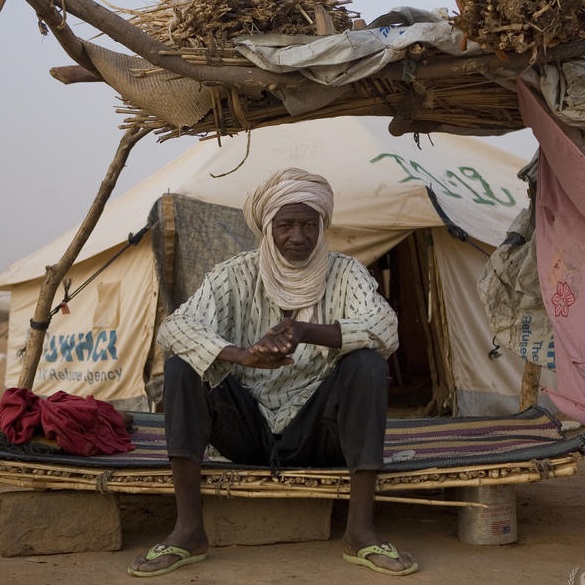Socio-economic assessment of Malian refugees - 2016
Burkina Faso, 2016
Get MicrodataIdentification
UNHCR-BFA-2016-SEA-v2.1
Socio-economic assessment of Malian refugees - 2016
| Name | Country code |
|---|---|
| Burkina Faso | BFA |
Other Household Survey [hh/oth]
UNHCR conducts socio-economic assessments of persons-of-concern (i.e. refugees, asylum-seekers, IDPs, etc.) in a variety of countries in order to inform and improve its programming with the goal of promoting self-reliance. While these assessments are not fully standardized and are tailored to their specific country context, the quantitative surveys share strong similarities in their design and objectives, and are therefore considered a survey series for the purpose of microdata documentation/archiving.
As a consequence of the armed conflict in the Gao, Kidal and Timbuktu regions of Mali, an estimated 32,000 Malian refugees have settled in Burkina Faso. Since 2012, UNHCR has been providing protection and assistance to these Malian refugees through multisectoral interventions. In order to assess the levels of vulnerability among these refugees and to identify potential opportunities for increasing their resilience, a quantitative survey was conducted among 6,775 Malian refugee households during April/May 2016.
Sample survey data [ssd]
Household and individual
Version
2.1: Edited, anonymous dataset for licensed distribution.
2018-12-15
Scope
The scope of the quantitative data of this socio-economic assessment includes:
- Identification of the household
- Demographic and economic characteristics of household members
- Housing characteristics and access to basic services
- Child protection and education - Food and other assistance
- Agricultural production
- Sources of income
- Asset ownership
- Food consumption
- Household expenditure
- Debt
- Shocks and "socio-economic violence"
- Social cohesion and participation
- Intentions of return
| Topic |
|---|
| Livelihood & Social cohesion |
Coverage
Areas hosting Malian refugees in Burkina Faso, i.e. Goudoubo and Mentao refugee camps, urban areas of Ouagadougou and Bobo-Dioulasso, and Oudalan Province.
All Malian refugee households residing in Burkina Faso.
UNHCR PPG: 1BFAA, 1BFAB
Producers and sponsors
| Name |
|---|
| UNHCR |
| Name |
|---|
| IFORD |
| AIRD |
| DRC |
Sampling
The survey's objective was to deliver representative data of all Malian refugees living in Burkina Faso. The total population of Malian refugees at the time of the survey was estimated at around 8,972 households. These refugees were located in Goudoubo and Mentao refugee camps, urban areas of Ouagadougou and Bobo-Dioulasso, and Oudalan Province.
The survey applied a full-coverage (census) approach, i.e. no sample selection was made. Out of the estimated total 8,972 households of interest, 7,177 households were retrievable from a registration database that served as the list frame for this survey. Interviews were attempted with all of these registered households. The total number of completed interviews (after non-response) was 6,775 households.
While the original data collection took a full-coverage approach, the public-release version of the dataset contains a systematically drawn sub-sample of this original data for reasons of statistical disclosure control. The total sample size in the dataset presented for public release is 1,690 households.
None.
Response rates (i.e. completed interviews over units selected from sampling frame) were 86.9% in Bobo-Dioulasso, 98.8% in Ouagadougou, 96.7% in Goudoubo camp, 95.0% in Mentao camp, and 90.0% in Oudalan Province. Overall response rate was 94.4%.
This dataset is self-weighting. Nevertheless, since the dataset presented here for public release contains only a sub-sample of the original data (see above), a uniform weights variable is provided in the data. (NB: This was adjusted slightly from uniformity to account for the slightly differing levels of non-response and frame coverage rates across the five locations of the study.)
Survey instrument
All questionaires are provided in section "external ressources".
Data collection
| Start | End |
|---|---|
| 2016-04-22 | 2016-05-15 |
- Face-to-face [f2f]
Data was collected on paper through face-to-face interviews by 50 enumerators (working in teams of 4-5 enumerators, each team headed by a field supervisor). Data entry was carried out at a centralized location using CSPro software.
Data processing
The dataset presented here has undergone light checking, cleaning and restructuring (data may still contain errors) as well as anonymization (includes removal of direct identifiers and sensitive variables, and grouping values of select variables). Moreover, it constitutes a sub-sample of the data originally collected.
Data Access
| Is signing of a confidentiality declaration required? | Confidentiality declaration text |
|---|---|
| yes | No attempt will be made to identify respondents or microdata providers, and no use will be made of the identity of any person, facility or establishment discovered inadvertently. Any such discovery would immediately be reported to UNHCR, to allow evaluation of further use, apply further statistical disclosure control methods, impose further restrictions on access, or appropriately re-classify the data. No attempt will be made to create links between datasets provided by UNHCR, or between UNHCR data and other datasets that could identify individuals or organizations. |
UNHCR (2016). Socio-economic assessment of Malian refugees in Burkina Faso 2016. UNHCR's Microdata Library; https://microdata.unhcr.org
Disclaimer and copyrights
UNHCR does not warrant in any way the accuracy of the information and data contained in the datasets and shall not be held liable for any loss caused by reliance on the accuracy or reliability thereof.
Contacts
| Name | Affiliation | |
|---|---|---|
| Solutions | UNHCR | solutions@unhcr.org |
Metadata production
UNHCR-BFA-2016-SEA-v1.2
| Name |
|---|
| UNHCR |
2019-07-22
Metadata version
Version 1.1 (July 2019)
